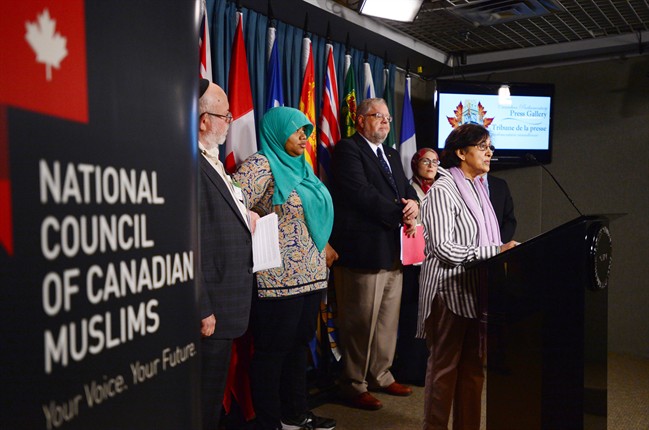Editor’s note: This article was edited to omit a reference to NCCM’s former association with a U.S.-based group.

You’d think there were Qur’an burnings on every street corner in Canada.
With the announcement from Statistics Canada that police-reported hate crimes against Muslims increased in 2015 — the most recent year for which data are available — many are responding, perhaps predictably, as though there is an epidemic of hate in Canada.
Of hate crimes motivated by religion, offenses directed to Muslims increased 60 per cent from the previous year, while those against Jews dropped by 16 per cent. Despite this, hate-motivated crimes against Jews still surpass those against all other religious groups, with 178 incidents reported, compared to 159 against Muslims.
Discussing racial and prejudicial realities is important, but in a country of over 36 million, 159 incidents hardly speaks to a broader narrative.
READ MORE: ‘What’s the next mosque?’: Imam talks of growing fears after Quebec attack
Hate crimes against Catholics rose by 57 per cent — yet no one is talking about them. Where’s the parliamentary motion to condemn Catholiphobia? I haven’t seen the Archbishop of Toronto call for policy changes, either.
Catholicism lacks the grievance industry driving the narrative that Muslims are Canada’s most persecuted group.
The terrorist attack allegedly committed by Alexandre Bissonnette at a Quebec City mosque in January was tragic and evil, but it was also an outlier. We can be grateful in Canada that this doesn’t happen with regularity against Muslims or any other group.
Of course there are examples of Muslims being victimized by crimes because of their religion, but there are many more attacks against people targeted for no reason at all. Are these less evil because there was no ‘hate’ behind them? They certainly aren’t crimes of love.
WATCH: Edmonton woman thankful police took hate crime complaint seriously

We are to believe that we’re living in an era of hate, which is why so many media outlets jump the gun when it comes to reporting on hate crimes — often with little to no follow-up when the initial story falls apart.
A bomb threat against Muslim students at Concordia University earlier this year was later revealed to have been the work of a 47-year-old Muslim man.

Get breaking National news
Just this week, former journalist Juan Thompson pleaded guilty to a string of bomb threats against Jewish community centres in the United States and Canada. He said he was trying to frame his ex-girlfriend, but it really had nothing to do with anti-Semitic hate — jarring as it was for North American Jews.
READ MORE: Man accused of making bomb threats to frame ex
My own city, London, Ont., played host to a faux hate crime last year when a hijab-wearing Muslim woman was assaulted in a grocery store by a female assailant who allegedly shouted slurs at her and ripped off her headscarf.
The tussle was held up across the country — including by Public Safety Minister Ralph Goodale, the National Council of Canadian Muslims and many journalists — as an example of Islamophobia in Canada.
WATCH: Spokesperson Congress of Aboriginal Peoples joins NCCM in calling for action on hate crimes

Notoriously absent from most coverage was the fact that the accused was an Iranian immigrant herself, who didn’t speak English and missed her court date because she was in hospital for mental health issues.
These are the cases that have more violent undertones. The vast majority of the police-reported hate crimes in the Statistics Canada data set are based on vandalism and other property-based offences. There is a difference between hate mongers and teenage provocateurs. This nuance is absent from the data.
The accompanying analysis also cautions that data comparisons should be taken with a grain of salt given the low numbers across the board.
“Because the number of hate crimes targeting specific populations is small, a change of a few incidents can have a considerable impact,” it reads.
READ MORE: Hate crimes against Muslims in Canada increase 253% over four years
None of this is to say that anti-Muslim bigotry doesn’t exist, nor even that some people may turn their prejudices into crimes. However we can’t let these statistics be contorted into the revelation of a problem that doesn’t exist on a wide enough scale to call it an epidemic, as a report by the Ontario Council of Agencies Serving Immigrants charged last summer.
Yet still, people are not only concluding a rash of Islamophobia is sweeping the nation, but even extrapolating as to the cause.
Prime Minister Justin Trudeau’s principal secretary, Gerald Butts, intimated on Twitter that this data — collected in 2015 — could be connected to the most recent federal election.
“What was going on in 2015, again?” he wrote alongside a link to the data.
I asked Butts whether he’d like to elaborate on his thoughts for this column; he politely declined.
The spokesperson for NCCM (formerly CAIR-CAN) didn’t mince words at all when connecting the stats to the election.
READ MORE: Crown seeks hate crime designation after man pleads guilty to setting Hamilton mosque fire
“Looking back to 2015, it was a difficult year for Canadian Muslims,” said NCCM vice-chairman Khalid Elgazzar at a news conference. “The Canadian Muslim community bore the brunt of sinister political rhetoric surrounding the federal election, which painted Muslims as terrorists or terror-sympathizers, as well as being anti-woman.”
The NCCM, which has previously called for anti-Islamophobia education in public schools, used the Statistics Canada release to push police departments to publish annual hate crime reports. The group has also asked the federal government to “study the growth of online hate.”
To what end, though? Words may hurt, but they aren’t generally crimes.
In a country as large and diverse as Canada, it shouldn’t surprise us that not everyone gets along.
Andrew Lawton is host of The Andrew Lawton Show on AM980 London and a commentator for Global News.












Comments